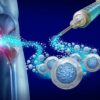
Understanding Bioidentical Hormone Replacement Therapy
Bioidentical Hormone Replacement Therapy (BHRT) is the use of hormones that are molecularly identical to the hormones that our bodies naturally produce. We prescribe them based on your individual needs with the goal of restoring hormonal balance.
Bioidentical hormones include estrogens, progesterone, DHEA, and testosterone. Herbal medicines or thyroid and adrenal hormones can be included as well.
Understanding the Differences: Traditional vs. Bioidentical Hormone Replacement Therapies
Traditional hormone replacement therapy (HRT) relies on synthetic hormones that differ structurally from those your body naturally produces. The estrogen in conventional HRT is often derived from pregnant mare urine, while synthetic progestins are laboratory-created approximations of progesterone. These structural differences can affect how these hormones interact with your body’s receptors.
At Interactive Health Clinic, our bioidentical hormone replacement therapy (BHRT) offers a more personalized approach. These hormones are precisely matched to the molecular structure of hormones naturally produced by your body. This structural identity allows for more efficient receptor binding and potentially fewer unwanted side effects.
When we address hormonal imbalances, we must consider the whole person – not just hormone levels but also lifestyle, stress management, nutrition, and environmental exposures. By utilizing bioidentical hormones as part of a comprehensive treatment plan, we can often achieve more balanced results that support the body’s natural healing capabilities while addressing root causes rather than just symptoms.
The distinction between traditional and bioidentical approaches represents different philosophies in addressing hormonal health – one focused on standardized symptom management and the other on personalized optimization of your body’s natural processes.
Let’s explore further how traditional hormone therapies compare to bioidentical hormone treatments.
1. Composition and Source
Traditional Hormones: These are often derived from non-human sources, such as the urine of pregnant horses or synthetically manufactured substances. Their chemical structure differs from the hormones naturally found in the human body.
Bioidentical Hormones: As the name implies, these are chemically identical to the hormones our bodies produce. They are typically sourced from plants, such as yams and soy, and then refined in labs to match human hormones precisely.
2.Natural vs. Synthetic Debate
Supporters of bioidentical hormones argue they are a more “natural” choice due to their identical chemical makeup to human hormones. This claim rests on the premise that matching our natural hormones will lead to fewer side effects and risks.
3.Safety and Effectiveness
Traditional HRT: These therapies have been well-studied, and while effective, they carry certain risks, such as increased chances of blood clots and breast cancer.
Bioidentical Hormones: Despite being marketed as safer because of their natural makeup, most experts caution that they carry similar risks to traditional therapies. Compounded bioidentical hormones, in particular, may not be FDA-approved, which can introduce variability and increased risk.
4.Regulation and Standardization
Traditional hormone therapies often undergo rigorous regulation and testing. In contrast, compounded bioidentical hormones may lack consistent quality checks, as they are custom-made in pharmacies and may not be subjected to the same comprehensive testing.
Who can benefit from BHRT?
As we age, we may at times feel that our bodies and minds work less effectively than they did when we were younger. We may notice that our thinking process has slowed, that our brains are “fuzzy”, and we get tired more easily. We could have problems sleeping, feel weaker, and find it nearly impossible to lose weight.
It’s easy to dismiss these symptoms as signs of getting older, but we can alleviate many if not most of these troublesome issues with the right therapy.
Additionally, hormonal imbalances don’t only happen to us as we get older. People of all ages can experience hormone imbalances, resulting in conditions like PMS, thyroid disorders, adrenal dysfunction, infertility, early menopause, and postpartum depression.
In men, symptoms can include reduced sexual function and desire, low energy levels, a decline in overall strength, and depression and/or irritability.
What can I expect from BHRT?
First, hormone testing is performed to assess your individual needs. A personalized treatment plan is then decided upon that matches your goals and lifestyle.
Hormones can be taken orally in capsules, used topically in a cream, or taken sublingually (under the tongue). After starting BHRT Therapy we expect your symptoms to improve, but in some cases the treatment will need to be adjusted. Follow-up testing and monitoring is essential to ensure success.
Is Bioidentical Hormone Replacement Safe?
BHRT is safe when replacing physiological levels of demonstrated hormone deficiencies and is monitored by your physician through testing and observation.
Before starting bioidentical hormone replacement therapy, it’s essential to consult with a healthcare provider. A medical professional can help determine whether BHRT is appropriate for your specific health needs and hormone levels. It’s also important to ensure that the treatment is monitored regularly to adjust dosages as needed and to avoid potential complications.
Contact Interactive Health Clinic for a BHRT Consultation
Have a question? Call Interactive Health Clinic today at (425) 361-7945 or schedule an appointment to learn more about how BHRT can help you feel your best!








